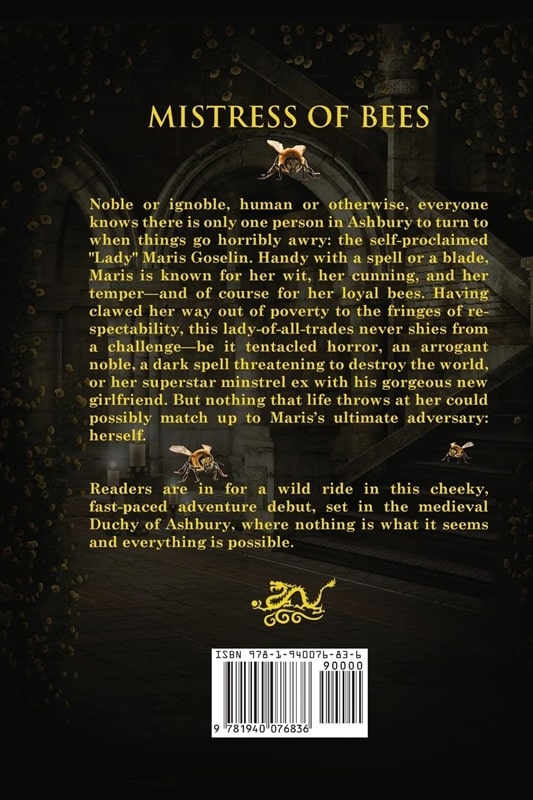New Treasures: Mistress of Bees by Bernie Mojzes
 |
 |
Mistress of Bees (Dragonwell Publishing, September 23, 2025)
Judge not a book by its cover, lest ye be judged. Possibly F. Nietzsche said this. More likely, he didn’t. But he should have, and in particular, he should have said it about the highly entertaining Mistress of Bees, from Dragonwell Publishing, and authored by Bernie Mojzes. I mention this because, based on the cover art, I didn’t know what to expect, but I am pleased to report that what’s hiding inside is exactly what a good many Black Gate readers are looking for.
Mistress of Bees features a successful blend of socially relevant High Fantasy and streetwise Sword & Sorcery, all nicely leavened with a sly sense of humor. Revolution with a Les Mis flair waits in the wings, and when it comes – as it does more than once – the ruling aristocracy gives way to plucky, upstart attempts at democracy, cheered on (always) by our hero, Maris Goselin.
(Lady) Goselin (named after a baby goose) proves to be a cranky but endearing narrator, and she leads readers through all but the last of these cleverly interlinked stories. I caught immediate echoes (however unintentional) of Howard Andrew Jones’s Hanuvarid, in that Mistress opens with a third party announcing that she has come into possession of Maris’s personal notes and diaries and intends, as of now, to set the record straight.
This metafictional opening gives Mojzes useful cover as he sets us down in Ashbury, but most especially in the neighborhood of Ashbury Park, where a bard named Spring (!) is about to take the stage. I spent the rest of the book searching out further Springsteen references, mostly without success, but the satirical die was effectively cast, and better yet, it never undercuts the action at hand. With or without the E Street Band, Maris has work to do: a nasty sorcerer has opened a gate to an Eldritch plane, and the local population is going to suffer a hideous death by tentacles – and right quickly, too – unless Maris “calls down the sun.”
Which she does, but rather like the atomic detonations in Hiroshima and Nagasaki, the collateral damage is staggering.
 Maris, then, is the sort of challenging anti-hero who does what she must, but not without leaving a trail of bodies in her wake, many of them guilty only of having strayed into her general vicinity.
Maris, then, is the sort of challenging anti-hero who does what she must, but not without leaving a trail of bodies in her wake, many of them guilty only of having strayed into her general vicinity.
As for organization, Mojzes’s method ultimately diverges from that of Jones; the former opted for unfurling his chapters in chronological order, whereas Mojzes, in keeping with his erratic and endlessly compromised protagonist, works in fits and starts, one step forward, two steps back.
The standout tale here is also the longest by a wide margin, “Wisgarth’s Legacy,” a thrilling novelette covering eighty-two pages of the book’s three-hundred-page total. Deftly weaving between three different viewpoints, one of them a book-within-a-book, “Wisgarth’s Legacy” is chock full of derring-do and magic, but also fairly brims with burgeoning romance. I was reminded of John Gardner’s October Light, a slice of literary fiction where the story is driven by an aging New Englander reading a “trashy novel,” one that holds up a mirror to the novel itself and asks its reader to wrestle with what is, and what is not, merely sensational.
Which brings us to the topic of sex. If you’re a prude, or if you find pansexuality to be an abomination, or if you simply have no sense of humor, avoid Mistress of Bees. Eroticism and romance never overwhelm the stories themselves, but Mojzes has no intention of drawing a (lace) curtain across so much of what animates the collective human endeavor, especially not with frank, bottom-line Maris holding center stage.
Officially, Mistress of Bees is part of a shared-world universe, specifically that of Fortannis, but at no point did I require any additional background or prequels to enjoy the work at hand. For those who wish to explore Fortannis further, Mojzes includes a helpful appendix.
Three excellent reasons to order a copy and dive right in: first, Maris and Mojzes are both worth the time, and second, small presses need all the support they can get. The third reason is this little nugget of relationship advice, dispensed in the final chapter by a newly deposed knight, one who is finally inching toward a proper understanding of heroism: “You love each other. So love each other. It’s not complicated.”
As if that’s not good enough as a stand-alone, read the book itself, and along comes the context. Life is always better in context.
Onward.
Mark Rigney is a writer and long-time Black Gate blogger. His work on this site includes original fiction and perennially popular posts like “Genre 2012: the Ghetto Remains the Same.” About his new novel, Vinyl Wonderland, reviewer Rich Horton said, “I was brought to tears, tears I trusted. A lovely work.” His favorite review quote so far comes from Instagram: “Holy crap on a cracker, it’s so good.” A preview post can be found HERE, while his website lives over THERE.



